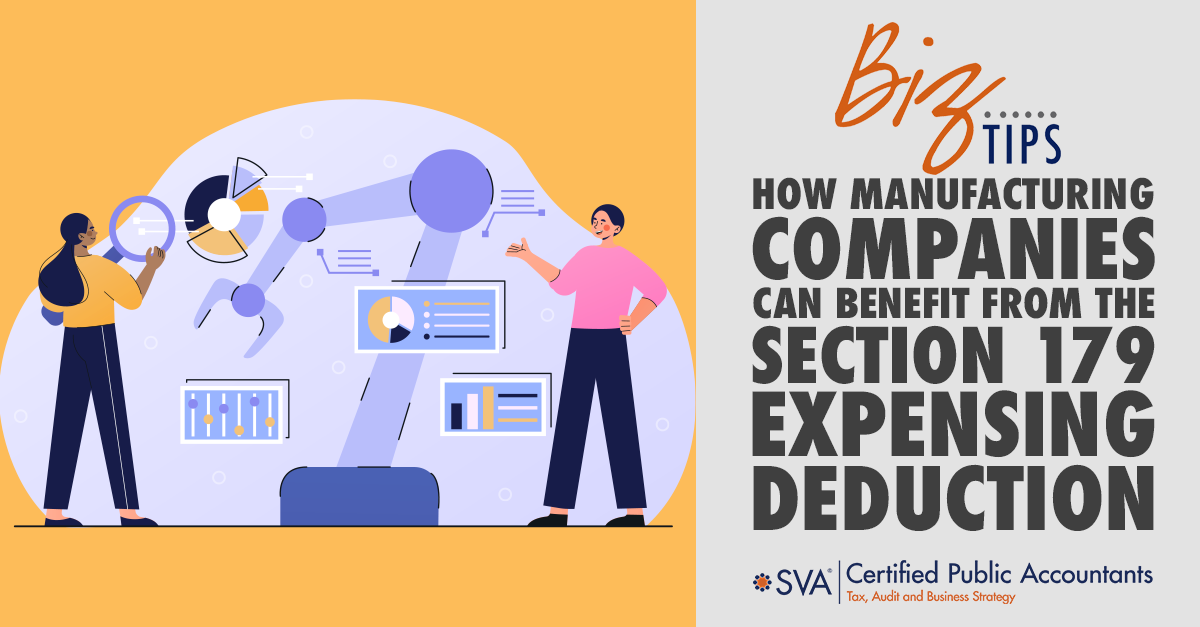With the passing of the One Big, Beautiful Bill (OBBB) in July 2025, there are changes to the Section 179 deduction. Read the following Biz Tip to learn the latest updates on the Section 179 deduction:
Section 179 Gets a Boost With New Expensing Limits |
Does your manufacturing company need to acquire new equipment to meet demand? Fortunately, there’s a tax break that can help: the Section 179 deduction.
It allows you to deduct this year the cost of qualifying new or used property you purchase. Your deduction can even exceed the amount you provided from your own funds to make the purchase.
However, there are two limits on Section 179 deductions that might stand in your way. So it’s important to understand all the relevant rules.
(Download Video Transcript)
Timing Is Everything
Federal tax law permits any type of business — C corporations, S corporations, partnerships, limited liability companies (LLCs), and even sole proprietorships — to elect to currently deduct or “expense” the cost of qualified business property placed in service during the year.
For this purpose, qualified business property includes most types of tangible personal property including software, computer and office equipment, certain vehicles, and machinery, as well as qualified improvement property. The property may be either new or used.
The key phrase is “placed in service.” This means you must begin using the property during the tax year. In other words, you can’t deduct the cost in 2022 if you keep, for example, a piece of machinery in storage until next year. But it doesn’t matter when during the year the property is placed in service. The maximum deduction is available whether this occurs in January, December, or somewhere in between.
The Tax Cuts and Jobs Act (TCJA) doubled the maximum deduction amount to $1 million, effective in 2018, while keeping a provision for inflation indexing. The maximum for 2022 is $1.08 million.
2 Key Limits
The maximum Section 179 deduction of $1.08 million provides plenty of leeway for many manufacturers, but two key limits could affect your purchasing decisions in 2022:
1. Annual Income Limit
The Section 179 deduction can’t exceed the net taxable income from the business’s activities. For example, if a manufacturer shows an $800,000 profit in 2022, the actual deduction is limited to $800,000, even if the property costs more.
2. Annual Dollar Threshold
If the total cost of property placed in service during the year exceeds an annual threshold, the maximum Section 179 deduction is reduced on a dollar-for-dollar basis. This dollar threshold has been adjusted by the TCJA in conjunction with the maximum Section 179 allowance, plus inflation indexing. Currently, the threshold is $2 million, indexed to $2.7 million in 2022.
Be mindful of these limits as the end of the year approaches.
Financing Your Purchase
Typically, if you need equipment or machinery to keep your manufacturing business humming, you won’t have all the cash on hand to complete the purchase. Fear not. You can still write off the full amount of the cost — up to the applicable limits — if you finance the purchase.
For example, let’s say your company needs $1 million of new equipment to meet its obligations for 2022. You can afford only a $250,000 down payment so you borrow the remaining $750,000 under favorable terms from a lender. You expect the company to realize profits of $5 million in 2022, so the annual income limit isn’t a problem.
Based on these facts, you can deduct the entire $1 million under Section 179, even though you’re financing three-quarters of the overall cost. Be aware that finance charges paid on the loan are deductible as business interest subject to the usual rules.
Claiming the Section 179 Deduction
Finally, keep in mind that the Section 179 deduction isn’t automatic. You must claim it on a property-by-property basis. In other words, you must claim each piece of equipment you place in service during the year. Contact us for more information.

© 2022

